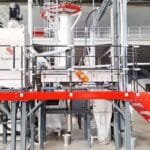The government has approved a new Central Sector Scheme – Pradhan Mantri Kisan SAMPADA Yojana (Scheme for Agro-Marine Processing and Development of Agro-Processing Clusters). The scheme will be implemented by the Ministry of Food Processing Industries (MoFPI).
What is Pradhan Mantri Kisan Sampada Yojana (PMKSY)?
The government of India (GOI) has approved a new Central Sector Scheme – Pradhan Mantri Kisan SAMPADA Yojana (Scheme for Agro-Marine Processing and Development of Agro-Processing Clusters) with an allocation of Rs. 6,000 crore coterminous with the 14th Finance Commission cycle. The scheme will be implemented by the Ministry of Food Processing Industries (MoFPI). Pradhan Mantri Kisan SAMPADA Yojana: (Click Here)
Objectives of PM Kisan Sampada Yojana:
- To supplement agriculture.
- To create processing and preservation capacities.
- To modernise and expand existing food processing units with a view to increasing the level of processing.
- To add value leading to the reduction of wastage.
PM Kisan SAMPADA Yojana is a comprehensive package that will create modern infrastructure with efficient supply chain management from farm gate to retail outlet. It will not only provide a significant boost to the growth of the food processing sector in the country but also help in providing better returns to farmers and is a big step towards doubling farmers income, creating tremendous employment opportunities, especially in the rural areas, reducing wastage of agricultural produce, increasing the processing level and enhancing the export of the processed foods.
Which Schemes Are Implemented Under PMKSY?
- Mega Food Parks
- Integrated Cold Chain and Value Addition Infrastructure
- Creation/ Expansion of Food Processing/ Preservation Capacities (Unit Scheme)
- Infrastructure for Agro-processing Clusters
- Creation of Backward and Forward Linkages
- Food Safety and Quality Assurance Infrastructure
- Human Resources and Institutions
- Operation Greens
Mega Food Park
The Mega Food Park Scheme aims to provide a mechanism to link agricultural production to the market by bringing together farmers, processors, and retailers to maximise value addition, minimise wastage, increase farmers’ income, and create employment opportunities, particularly in the rural sector. The Mega Food Park Scheme is based on the “Cluster” approach. It envisages the creation of the state of the art support infrastructure in a well-defined agri / horticultural zone for setting up modern food processing units in the industrial plots provided in the park with a well-established supply chain. Mega food park typically consists of supply chain infrastructure including collection centres, primary processing centres, central processing centres, cold chain and around 25-30 fully developed plots for entrepreneurs to set up food processing units.
The Mega Food Park project is implemented by a Special Purpose Vehicle (SPV), a Body Corporate registered under the Companies Act. State Government, State Government entities and Cooperatives are not required to form a separate SPV to implement the Mega Food Park project. Subject to fulfilment of the conditions of the Scheme Guidelines, the funds are released to the SPVs. To view the status of 41 Mega Food Parks funded under the scheme (Click Here).
Proposals for seeking assistance under the scheme are invited through Expression of Interest from time to time.
Integrated Cold Chain and Value Addition Infrastructure
The objective of the Scheme of Cold Chain, Value Addition and Preservation Infrastructure is to provide integrated cold chain and preservation infrastructure facilities, without any break, from the farm gate to the consumer. It covers creation of infrastructure facility along the entire supply chain viz. pre-cooling, weighing, sorting, grading, waxing facilities at farm level, multi product/ multi temperature cold storage, CA storage, packing facility, IQF, blast freezing in the distribution hub and reefer vans, mobile cooling units for facilitating distribution of horticulture, organic produce, marine, dairy, meat and poultry etc. The scheme allows flexibility in project planning with special emphasis on creation of cold chain infrastructure at farm level.
The integrated cold chain project is set up by Partnership / Proprietorship Firms, Companies, Corporations, Cooperatives, Self Help Groups (SHGs), Farmer Producer Organizations (FPOs), NGOs, Central / State PSUs, etc. subject to fulfillment of eligibility conditions of scheme guidelines.
The scheme is under implementation since 2008. To view the status of implementation of the Cold Chain Projects (Click Here).
Creation/ Expansion of Food Processing/ Preservation Capacities (Unit Scheme)
The main objective of the Scheme is creation of processing and preservation capacities and modernisation/ expansion of existing food processing units with a view to increasing the level of processing, value addition leading to reduction of wastage. The processing activities undertaken by the individual units covers a wide range of post-harvest processes resulting in value addition and/or enhancing shelf life with specialized facilities required for preservation of perishables. While expansion of processing capacity is necessary to increase the level of processing and reduce wastage, the induction of modern technology is intended to make a clear difference in terms of process efficiencies as well as improving the quality of the end product. The setting up of new units and modernization/ expansion of existing units are covered under the scheme.
Scheme is implemented through organizations such as Central & State PSUs/ Joint Ventures/ Farmer Producers Organization (FPOs)/ NGOs/ Cooperatives/ SHG’s/ Pvt. Ltd companies/ individuals proprietorship firms engaged in establishment/ upgradation/ modernization of food processing units.
Proposals for seeking assistance under the scheme are invited through Expression of Interest from time to time. To view notice inviting proposals (Click Here) and to submit proposals online (Click Here).
Infrastructure for Agro-processing Clusters
The scheme aims at development of modern infrastructure and common facilities to encourage group of entrepreneurs to set up food processing units based on cluster approach by linking groups of producers/ farmers to the processors and markets through well-equipped supply chain with modern infrastructure. Each agro processing clusters under the scheme have two basic components i.e. Basic Enabling Infrastructure (roads, water supply, power supply, drainage, ETP etc.), Core Infrastructure/ Common facilities (ware houses, cold storages, IQF, tetra pack, sorting, grading etc) and at least 5 food processing units with a minimum investment of Rs. 25 crore. The units are set up simultaneous along with creation of common infrastructure. At least 10 acres of land is required to be arranged either by purchase or on lease for at least 50 years for setting up of Agro Processing Cluster. To view Indicative list of identified agri-horti production clusters (fruits & vegetables) (Click Here) and visit Geo-Sampada on spread & depth of agri-resources (Click Here).
Agro processing clusters set up by Project Execution Agency (PEA)/ Organisation such as Govt./ PSUs/ Joint Ventures/ NGOs/ Cooperatives/ SHGs/ FPOs/ Private Sector/ individuals etc. and are eligible for financial assistance subject to terms and conditions under the scheme guidelines.
The Project Execution Agency (PEA) which is responsible for overall implementation of the projects undertakes various activities including formulation of the Detailed Project Report (DPR), procurement/ purchase of land, arranging finance, creating infrastructure, ensuring external infrastructure linkages for the project etc. PEA may sell/ lease plots in agro-processing cluster to other food processing units but the common facilities in the cluster cannot be sold or leased out.
Proposals for seeking assistance under the scheme are invited through Expression of Interest from time to time. To view notice inviting proposals (Click Here) and to submit proposals online (Click Here).
Creation of Backward and Forward Linkages
The objective of the scheme is to provide effective and seamless backward and forward integration for processed food industry by plugging the gaps in supply chain in terms of availability of raw material and linkages with the market. Under the scheme, financial assistance is provided for setting up of primary processing centers/ collection centers at farm gate and modern retail outlets at the front end along with connectivity through insulated/ refrigerated transport.
The Scheme is applicable to perishable horticulture and non-horticulture produce such as fruits, vegetables, dairy products, meat, poultry, fish, Ready to Cook Food Products, Honey, Coconut, Spices, Mushroom, Retails Shops for Perishable Food Products etc. The Scheme would enable linking of farmers to processors and the market for ensuring remunerative prices for agri produce. The scheme is implemented by agencies/ organizations such as Govt./ PSUs/ Joint Ventures/ NGOs/ Cooperatives/ SHGs / FPOs / Private Sector / individuals etc.
The Ministry has engaged Technical Agencies(TAs) for assisting farmer/ producer groups including Farmer Producer Companies, Farmer Producer Organization, Self Help Groups to facilitate their participation under the Scheme. The TAs are responsible for preparation of Business Plan, Detail Project Report, Capacity Building, Trainee and other related support services. For Responsibilities of TAs (Click Here) and for contact (Click Here).
Proposals for seeking assistance under the scheme are invited through Expression of Interest from time to time. To view notice inviting proposals (Click Here) and to submit proposals online (Click Here).
Food Safety & Quality Assurance Infrastructure
Quality and Food Safety have become competitive edge in the global market for food products. For the alround development of the food processing sector in the country, various aspect of Total Quality Management (TQM) such as quality control, quality system and quality assurance should operate in a horizontal fashion. Apart from this, in the interest of consumer safety and public health, there is a need to ensure that the quality food products manufactured and sold in the market meet the stringent parameters prescribed by the food safety regulator. Keeping in view the aforesaid objectives, government has been extending financial assistance under the scheme under the following components:
- Setting Up/Up-gradation of Quality Control/Food Testing Laboratories
- HACCP/ ISO Standards/Food Safety/Quality Management Systems
Setting Up/Up-gradation of Quality Control/Food Testing Laboratories
In the interest of consumer safety and public health, there is a need for testing food products in order to ensure that it complies with domestic standards as well as international standards for exports. There is also a need for testing of all imported food products to ensure that they are of the requisite standard and food products not permitted for manufacture domestically are not allowed to come in from foreign markets. Apart from this, the level of contaminants, additives, and pesticide residues in food items is required to be monitored regularly. Therefore, a network of food testing and analysis laboratories is required to support the surveillance system of food regulator, timely analysis of samples and ensure compliance of international and domestic standards on food in case of exports as well as imports.
Under the scheme, Central/ State Government and their organizations/ Government universities (including deemed universities) and all other implementing agencies/private sector organizations/universities (including deemed universities) are eligible to receive financial assistance for setting up of food testing laboratories.
Food Safety and Quality Assurance Infrastructure
HACCP, ISO Standards are necessary condition for improving the overall quality of food safety & hygiene in the country and also to increase India’s share in global food trade. The main objective of the scheme is to motivate the food processing industry for adoption of food safety and quality assurance mechanisms such as TQM including ISO 9000, ISO 22000, HACCP, GMP, GHP. This will enable adherence food processors to the stringent quality and hygiene norms thereby protecting the health of consumers, enhance product acceptance by buyers, both domestic & overseas and keep Indian industry technologically abreast of international best practices.
Central/ State Government Organization, IITs, Universities and private sector in the field of food processing sector are eligible for assistance under the scheme for implementation of HACCP/ ISO Standards / Food safety/ Quality Safety Management Systems.
Grant-in-aid is given in the form of re-imbursement of expenditure towards implementation of HACCP/ ISO Standards/ Food safety/ Quality Management Systems @ 50% in general area and @ 75% in NE Region and difficult areas of eligible project cost subject to maximum of Rs. 17 lakh and 22 lakh respectively. With a view to clear the pending proposals, the Ministry has not been accepting fresh application as a temporary measure.
HACCP Projects assisted by Ministry of Food Processing Industries (Click Here).
Quality Council of India has launched two Certification schemes namely “IndiaGHP” and “IndiaHACCP” based on globally accepted Codex Standards for adoption by food manufacturers and supply chain operators. These schemes will help India food chain related industry to demonstrate compliance to global standards without having to go for costly and time consuming foreign certifications as many countries have mandated Haxaed Analysis Critical Control Point (HACCP) for high risk sectors like meat, fish, dairy etc. and most developed countries have also mandated Good Hygienic Practices(GHP) across all food sectors. The details of the schemes are available on QCI website (Click Here).
Human Resources and Institutions
Research & Development
Under the scheme, the Ministry of Food Processing Industries has been extending financial assistance to undertake demand driven R&D work for the benefit food processing industry in terms of product and process development, efficient technologies, improved packaging, value addition etc. with commercial value along with standardization of various factors viz. additives, colouring agents, preservatives, pesticide residues, chemical contaminants, microbiological contaminants and naturally occurring toxic substances within permissible limits.
Promotional Activities
To organize, co-sponsor, participate in all India level seminars, workshops, fairs and exhibitions for food processing sector to encourage investment in food processing and to create awareness of the schemes being implemented by the ministry. To commission studies/ surveys to assess, evaluate various aspects of food processing sectors and allied activities. To create awareness about schemes of the ministry through print/ audio-visual media through advertisements and publicity materials. To organize road shows, development of software and investor facilitation activities to promote food processing sector.
Skill Development
To provide sector specific skilled workforce from floor level workers, operators, packaging and assembly line workers to quality control supervisor etc in the various segments of food processing industries.
To contribute towards achieving the projected skilled human resources requirement as envisaged by National Skill Development Corporation (NSDC) in food processing sector i.e 17.8 million persons by the year 2022.
Apart from implementation of the Skill component under PMKSY, a number of initiatives have been taken by GOI to address the skill gap in the food processing sector. The Ministry of Food Processing Industries is working in close collaboration with other related agencies to augment skilled manpower in the food processing sector. The Ministry is collaborating with the Food Industry Capacity and Skill Initiative (FICSI), the sector Skill Council (SSC) in food processing, for the validation of the Qualification Packs (QPs) for identified job roles and developing course curriculum for food processing sector through the National Institute of Food Technology Entrepreneurship and Management (NIFTEM).
Strengthening of Institutions
(a) National Institute of Food Technology, Entrepreneurship and Management (NIFTEM):
The Ministry has established the NIFTEM at Kundli, District Sonepat, Haryana in May, 2012. NIFTEM has been declared a Deemed University under de novo category. NIFTEM is running the B. Tech., M. Tech. & Ph.D courses and undertakes R&D projects in the area of food technology. Under the scheme, funds will be provided to NIFTEM for creation of academic and administrative infrastructure like foreign student’s hostel, sports facilities, hazardous chemical storage, effluent treatment plant, solid waste management system, residential units etc. Funds will also be provided to promote research activities, expand Village Adoption Program (VAP) and skill development in the food processing sector. An allocation of Rs. 100 crore has been made during the period of scheme.
(b) Indian Institute of Food Processing Technology (IIFPT):
The Ministry has upgraded IIFPT, Thanjavur, Tamil Nadu to a National level institute in February, 2008. IIFPT is running the B. Tech., M. Tech. & Ph.D courses and undertaking R&D projects in the area of food processing. Under the scheme, funds will be provided to IIFPT for creation of infrastructure facilities including purchase of additional land (22.7 acres) for expanding campus and creation of academic and administrative infrastructure like machine fabrication and testing centre, sport complex, auditorium, opening training cum incubation centres and residential units etc. To enable the institute to expand its activities and programmes to meet the ever expanding need of food processing sector in the country, an allocation of Rs. 75 crore has been made during the period of scheme.
Operation Greens
In the budget speech of Union Budget 2018-19, a new Scheme “Operation Greens” was announced on the line of “Operation Flood”, with an outlay of Rs.500 crore to promote Farmer Producers Organizations (FPOs #), agri-logistics, processing facilities and professional management. Accordingly, the Ministry has formulated a scheme for integrated development of Tomato, Onion and Potato (TOP) value chain. Proposals for seeking assistance under the scheme are invited . To view notice inviting proposals (Click Here).The applicant fulfilling the eligibility criteria under the scheme is required to submit the online application on SAMPADA portal of the ministry (Click Here).
RELATED LINKS
- Agro Processing Clusters Scheme- Registration
- Pradhan Mantri Kisan Sampada Yojana- Press Release
- Booklet – Ministry of Food Processing Industries (MoFPI)
- Agro-Processing Clusters – Sign In
- Pradhan Mantri Kisan Sampada Yojana (PMKSY)
- Ministry of Food Processing Industries (MoFPI)

Photo created by freepik
















